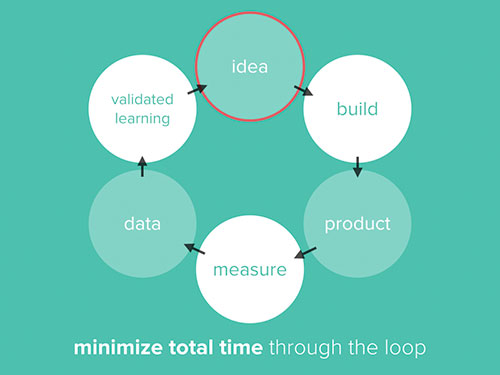What is a "startup"?
Taken in the broadest possible sense, a startup is an organization which is working to create something new, in conditions of extreme uncertainty.
From this point of view there is little to differentiate between the classic startup consisting of three college kids working out of their Dad's basement and a division of a large company planning a new line of products for a market in which they have never operated before.
The chimera of success
What is the formula for a successful IT product?
Thanks to their being blinded by the myth of the visionary entrepreneur — who is able to achieve project goals armed only with his or her own innate abilities and intuition — many try to manage a startup using the following methodology:
- Identify a problem to be solved or a need to be satisfied
- Prepare a detailed business/investment plan
- Research funding and possible partnerships
- Realize the project, complete with all of its features
- Obsessively perfect every detail of the product go get it ready for prime-time
- Launch the product officially
In reality, however approximately 90% of all startups fail, and the strategy just described is one of the main causes of this unfortunate state of affairs.
After endless discussions with backers, months of development and enormous amounts of investment, the poor entrepreneur discovers, at the launch of his product, an almost total disconnection between their imagined scenario and reality: the market doesn't respond as expected, the users have difficulty understanding the value proposition of the product, half of the "indispensable" features remain unused.
At the same time, the users begin to behave in entirely unexpected ways and to ask for completely unexpected things! _"These would be really interesting ideas to explore"_, we hear clients say: if it wasn't for the fact that by now the budget is almost exhausted and the only thing that anyone can do is stand by and watch helplessly as all of the time and money put into the project go down the drain.
What happened?
These high rates of failure, combined with the continual repetition of the same errors, can only lead one to the conclusion that there is a systemic problem: the classic entrepreneurial strategy, borrowed from the world of industry, is clearly incapable of serving the requirements of startups, which by definition have to operate in "conditions of extreme uncertainty".
The classic _business plan_, however detailed it may be, is a totally inadequate instrument for modelling the multitude of different variables in play and correctly assessing risky conditions of this kind.
The moment of "extreme uncertainty" is the least advisable time to take high risk decisions.
Lean Startups
In 2008, after years of working for, founding and advising Californian startups and seeing first hand the failure of many projects — this despite the high quality of the software they produced and of the ideas underlying them — Eric Ries founded a “movement” called Lean Startup, the tenets of which are set out in his book of the same name. The aim of this movement was to identify alternative development strategies better adapted to the particular conditions of startups.
The value validation and growth hypothesis
The Lean Startup methodology is based on the assumption that, given the conditions of extreme uncertainty in which they operate, the primary aim of startups cannot be to produce software, make money or serve clients. Rather, the first task of a startup to evaluate the hypothesis that it can create value, enjoy popularity and grow.
Only at this point, with a less uncertain business model in hand, will it be possible to take advantage of more conventional tools, such as the _business plan_, to evaluate probable growth over time.
A leap into the unknown vs. The scientific method
The Lean movement's breakthrough has been to apply the classic empirical cycle of "hypothesize, test and proove" to startup management, abandoning the vision of the startup as a "bet" based on the "instincts" of an entrepreneur, in favour of a scientific approach based on experimentation, albeit on a small scale, and objective measurement.
It doesn't matter how sure we are that our idea is good: the first obligatory step is to find the fastest and cheapest possible way of presenting it to its potential audience, in order to verify the level of interest that it produces and capture as much useful feedback as possible.
The initial vision that drives an entrepreneur to follow an idea is only the point of departure for a process of discovery. Based on the real world feedback received, the initial hypothesis can itself be continually modified and refined. This process works to produce a a prototype for a sustainable business based on data and concrete evaluations which drastically reduce initial uncertainty.
The Lean cycle

The Lean approach is predicated on the application of short iterative and incremantal cycles in order to carry out continuous, small-scale field experiments to verify all of the different elements that make up the vision of the product. According to this methodology, the correct unit of measurement for the progress of a startup is not earnings, but proven knowledge gained in the field of operation.
The fundamental steps of the Lean approach are the following:
- Definition of a single objective
- Definition of an objective metric by which this objective can be measured (number of visits, number signed up to the mailing list, number of visits to the final page of a funnel, etc.)
- Construction of the minimum prototype capable of carry out the experiment
- Execution of the experiment
- Analysis of the resulting metric
Phase 3 is referred to as the Minimum Viable Product (MVP) phase. It represents that quickest, easiest way of moving through the production-measurement-knowledge cycle.
The shorter and quicker the cycles are, the more MVP cycles can be carried out, the less waste of resources will take place and the more progress the startup will be able to make.
Using MPVs in this way, it is possible to assess the development of a completed product in days or weeks, rather than months.
The luxury of being able to change course ahead of time
Regardless of the success or otherwise of the operation, each cycle of production and measurement produces proven, field-tested knowledge.
So what do you do when you realize that a hypothesis doesn't work?
History has demonstrated that the initially strategy of a startup is rarely the open that will lead it to success. Products we use every day, such as Flickr, Youtube, Groupon and Twitter were founded "to do one thing" and have transformed into quite another. If you're curious, take a look at their stories.
Pivot: a drastic change in strategy without compromising the vision
The pivot is one of the fundamental, natural stages in the development of a Lean startup. It is the moment in which, having obtained a greater level of proven knowledge, a decision is made to drastically modify strategy, while maintaining the original vision.
This process of constant experimentation and adaptation makes it possible to explore and take advantage of "secondary" ideas arising from the originally envisioned process.
Why we advise this approach for those who wish to create a startup
“We don't have enough money to develop the fantastic product we have in mind, but we're sure that it's a winner. We have our fingers on the pulse of the situation and you have technical competence to develop the application. Invest with us and in a couple of years we'll all be rich!”
This is a "mantra" that we often hear repeated by potential startupper clients who come to us to ask for a kind of partnership that we don't necessarily see in the same light as they do. Beginning with a minimal product which can give short-term results, as well as having the advantages set out above, means reducing your investment and "being able to afford it". It means not wasting resources that will be useful for future development. It also means not having to tie yourself to technological partnership, leaving open the possibility of internal developments taking place only once you have been able to verify that the conditions for them are correct and that they are of practical necessity.
As a company, we are extremely interested in creating quality products, in order to be able to recount stories of success. A large product that "dies" quickly is certainly not a success and nor is it the kind of story we enjoy telling. That's why we prefer that our clients spend less and have a chance to test out their ideas. We are convinced that this is the best way to ensure solid, long-term results.
This makes it easier for us to create success stories together. The philosophy we like to follow is "It works well if it works for everyone!"!
<a href="/contact">Do you have an idea and want help creating an MVP?</a>
